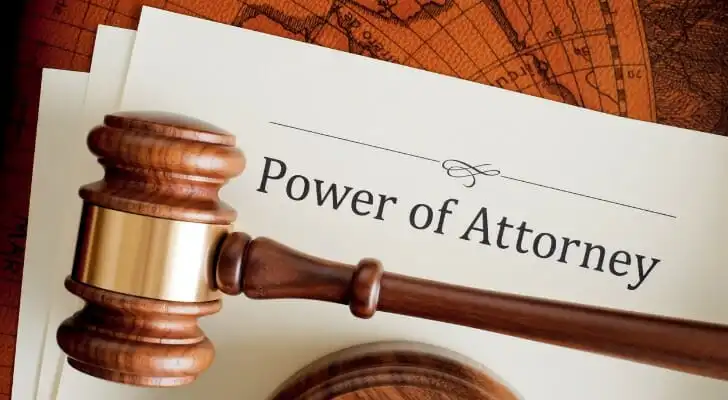Paying yourself as power of attorney can raise legal and ethical questions, since the role comes with fiduciary duties to act in the best interests of the person granting the authority. Generally, a power of attorney cannot transfer money to themselves unless the legal document specifically allows compensation or gifts. Even when permitted, such actions are often closely scrutinized to prevent misuse. Understanding how these rules apply helps clarify the limits of authority and the protections in place for the person whose finances are being managed.
A financial advisor can help you understand if there are alternatives to creating a power of attorney as you engage in estate planning.
What Is Power of Attorney?
Power of attorney is when you assign someone the authority to make legally binding decisions on your behalf. This can mean managing financial assets, making choices regarding medical care, signing contracts and other commitments. A power of attorney can access confidential materials and their decisions are as binding as if you had made them yourself.
Most of the time, power of attorney is a limited grant of authority. That is to say, you will give someone power of attorney to do specific things or to act within a specific scope. For example, the IRS ordinarily would not accept taxes filed by a third party; you must file your taxes yourself. However, assigning power of attorney to your tax preparer gives that person the authority to file your taxes as though you had done so yourself. This is a common practice and lets the tax preparer see a client’s confidential IRS and bank records, as well as filing taxes on the client’s behalf. Such power, however, doesn’t allow the person to sign contracts in your name or sell your car. Their authority is limited to reviewing your finances and filing documents with the IRS.
In some cases you may assign what’s known as a general power of attorney, which authorizes someone to handle a wide range of financial and legal matters on your behalf. Other common types include a limited or special power of attorney, which is restricted to specific tasks, and a healthcare power of attorney, which applies to medical decisions. Any of these can be made durable, meaning the authority continues even if you become incapacitated. People often grant a general power of attorney to a trusted family member or long-time friend if they expect to be unavailable or unable to manage their affairs.
Limits on Power of Attorney Asset Transfers
However, even a general power of attorney has limits. As a general rule, a power of attorney cannot transfer money, personal property, real estate or any other assets from the grantee to themselves. Most, if not all, states have laws against this kind of self-dealing. It is generally governed as a fraudulent conveyance (that is, theft by fraud). The grantee can enforce these laws in both civil and criminal court and, when possible, they can have any transactions unwound.
If the grantee is unavailable, incapacitated, legally not competent or otherwise unable to enforce their own rights, third parties will typically have the right to enforce these laws. Most often that includes family members and potential heirs.
This rule also applies to transfers in the power of attorney’s interest. For example, a power of attorney could not transfer the grantee’s assets to a spouse or child either. Generally speaking, a court will look suspiciously at any unnecessary or uncompensated transfer from a power of attorney, especially if the grantee was unaware of the transfer or legally incompetent.
For example, say you were to deed yourself a grantee’s home. The grantee could have that transfer declared null and void, and the title would remain in their name. This would create a particular mess if you deeded yourself their home and then sold it. In that case the sale itself would also likely be declared null and void, and you would likely owe the purchaser both a refund and damages.
When Power of Attorney Permits Asset Transfers
However, a power of attorney can transfer assets to themselves if they have specific written consent from the grantee. The grantee can authorize most forms of property transfer, as long as the assets are theirs to give and as long as the authorization is specific. Something like “authority to take money as necessary” will not typically be enforceable.
Usually this is included in the power of attorney form itself as courts may require notarization in order to honor this authority.
Grantees can only give this authority if they are mentally and legally competent. If you anticipate wanting your power of attorney to have this authority at some point, be sure to contemplate it in the original grant. You may not be able legally to amend this document when the issue comes up down the line.
Asset transfer comes up most often in three circumstances:
Payments
For people who will need a lot of help, acting as power of attorney can take up a significant amount of time. Often the grantee will contemplate some form of compensation in exchange for these services.
Typically, payment will be authorized directly in the power of attorney form. For example, the power of attorney may authorize an hourly rate of pay or an up-front payment in exchange for services. The power of attorney may transfer money from the grantee in order to meet those terms.
The power of attorney should keep scrupulous records regarding any arrangement, for example recording every hour worked in cases of an hourly rate of pay, as third parties (particularly heirs) can sometimes demand legal oversight of any withdrawals.
Heirlooms and Real Estate

It is also not uncommon for families to use power of attorney as a way to transfer significant property, such as real estate and family heirlooms across generations. For example, you might authorize power of attorney for your son or daughter to write what is known as a quitclaim deed on the family home. This would let them assign the house from you to themselves if and when it’s time for them to take over that property.
This can be a relatively easy way of setting up a future transfer. You don’t want to give up your home yet, but someday you do want the next generation to have it. However, as with most power of attorney actions, it is important to understand that the fewer boundaries you put on this authority, the more trust you must have that the person will act according to your wishes and timing.
Acting On Existing Authority
This is rare but in some cases a power of attorney can transfer assets to themselves if it is required by some other aspect of their power of attorney grant. For example, say that acting as someone’s power of attorney required you to buy plane tickets and travel. You might be able to claim reimbursement from the grantee’s accounts if you can demonstrate that those expenses were both necessary and completely within the scope of your authority.
While this does not come up often, it is most likely to apply in cases when the grantee is legally incompetent or otherwise incapacitated. If the grantee is competent and available, it’s likely that a bank or court will defer to the person’s judgment about your actions and reimbursement.
Power of Attorney vs. Executor of an Estate
It’s important to distinguish the responsibilities of someone with power of attorney and someone designated as the executor of an estate.
The executor oversees the estate during probate, which involves filing the deceased’s will with the court, identifying and gathering assets, settling outstanding debts and distributing the remaining property to the rightful beneficiaries.
The two roles, power of attorney and estate executor, may be filled by the same person, but the roles themselves are very different.
Bottom Line

A power of attorney carries broad responsibility but comes with clear boundaries, particularly when it comes to personal gain. While certain situations allow compensation or asset transfers with explicit permission, courts and heirs often scrutinize these actions to prevent abuse. The structure of the agreement and the language used in the document determine how far those powers extend.
Tips on Estate Planning
- If you need help planning your estate and securing your family’s future, consider working with a financial advisor who specializes in estate planning. Finding a financial advisor doesn’t have to be hard. SmartAsset’s free tool matches you with vetted financial advisors who serve your area, and you can have a free introductory call with your advisor matches to decide which one you feel is right for you. If you’re ready to find an advisor who can help you achieve your financial goals, get started now.
- Retirement plans, life insurance policies and payable-on-death bank accounts typically pass directly to named beneficiaries, regardless of what’s stated in your will. Coordinating these designations with the rest of your estate plan prevents conflicts and unintended outcomes.
Photo credit: ©iStock.com/Creativeye99, ©iStock.com/ArisSu, ©iStock.com/Daisy-Daisy
